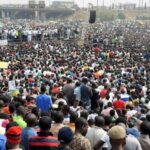
On the face of it, there is nothing to worry about the chaos in the two major political parties, APC and PDP. It is normal in election seasons such as this for political parties to find themselves embroiled in all sorts of intra-political crises with some of their long-term members criss-crossing the party lines both in frustration and in search of easier access to the inner sanctums of political power.
In midst of the chaos, power is aligned and re-aligned; old political foes become new friends and new paths to political power are charted. This may even be good for the polity and democracy itself, the very delicate system of governance everyone is anxious to protect and defend.
The strongest pillar of democracy, and I am not saying anything new here, is the political party. Without it, it is impossible to talk of democracy. It goes without say but I will say it, if political parties are in chaos there is trouble in the political kingdom. Crises weaken the parties. One good reason why the fortunes of political parties rise and dip.
It seems that SDP is in the process of a surprise resurrection and might be the beneficiary of the crises in APC and PDP. I see a trickle of established politicians, some of whom had so far refused to desert the PDP, flowing into SDP. Some of us may be excited about the emergence of a third major political party in the country but the implications of the parties haemorrhaging badly must not be lost on us. If every election season births a new major political party made up of frustrated men and women from their former parties, it would become increasingly harder for us to grow our democracy on the pillars of democracy – the political parties.
Our politicians are missing some critical fundamentals in party politics. We are, and you do not need to provide empirical evidence for this, certainly anxious to consolidate and deepen our democracy. What is happening among the politicians and their political parties shows what a short distance we have covered in the glorious 19 years of democracy, or at least, constitutional rule or misrule. We are still unable to build political parties able to withstand the storm and the rain of political shenanigans and conflicting political interests. Our political parties are in a permanent state of flux. There are no permanent party members and leaders. Jumping ship has become the new face of political pragmatism. It always was any way because when your stomach grumbles, your eyes are forced to see the light.
The lack of political ideologies subscribed to and promoted by the political parties is not healthy for the polity. The politicians are not trying to remedy this glaring deficit. They choose to keep running the parties as mere groups of people who come together during election seasons to plot their path towards winning or capturing and sharing power in the executive and the legislative branches of government.
We remember what happened to PDP in 2014/15. The party that had been in power at the centre and in most of the states for 16 years suddenly imploded and was deserted by a man who served as president for two terms on its platform. Nearly all former governors, national and state houses of assembly legislators who had made political and other fortunes under the big umbrella, abandoned the party and allowed it to haemorrhage to its near political demise.
It lost the 2015 presidential election and its control of the states shrank from the overwhelming majority to four states in the South-South. Its leaders have shown no particular appreciation of the dynamics of the politics of recovery in a nation that values power much more than its use. The party remains as divided as ever since its surprise election defeat nearly three years ago delivered a powerful message to the assumed sense of destiny by its leaders: no political condition is permanent.
We rejoiced and welcomed the birth of the new darling party, APC. We thought that the party symbol of a broom signified our collective desire to clean up our political acts and set the country back on the path of deepening democracy, the rule of law and the best practices in modern governance and accountability. Nearly three years in office later, our once darling new party is already sclerotic. Its leaders have so far failed to turn this gathering of the ambitious, the frustrated and the disappointed power seekers into a political party, properly equipped with an ideological stand on the issues that agitate and threaten to divide us as a nation. It is today pathetically factionalised and badly fractured along its major fault lines of the power blocks that birthed it.
Senator Ahmed Bola Tinubu is trying to carry out a presidential directive to unite the party. If he and the president thought this would be a piece of cake, events so far have shown that it is anything, but. Disunity in the party is glaring. It is glaring too that the party appears to have overdrawn its deposit in its bank of public goodwill. The truth, even if its leaders choose to believe the contrary, is that the party is on the verge of imploding. If it happens, there would be rejoicing and there would be the gnashing of teeth in the land.
Its implosion would have obvious consequences for our fitful attempts at consolidating and deepening our democracy through the instrumentality of our political parties. If we must begin again in every election season or circle, then there is little hope that we can build strong political parties able to chart new courses for our national development. One good reason why we should not see the current chaos in the parties as the exclusive business of the politicians. It is a mistake, a bad mistake to do so. As a wit whose name I cannot now remember once said, politics is too serious to be left to the politicians.
The bloody Monday in Idoma land
The unprovoked killing of 24 people at Omusu village in Okpokwu local government on Monday, March 5, once more confronts us with the obvious inability of the Nigerian state to protect us against the marauding killers known as Fulani herdsmen. We have all become sitting ducks. It is frightening. I have written on this many times. All I can do at this time is to silently grieve with the families of the dead in Omusu as I do for those in Taraba State.
 Join Daily Trust WhatsApp Community For Quick Access To News and Happenings Around You.
Join Daily Trust WhatsApp Community For Quick Access To News and Happenings Around You.


